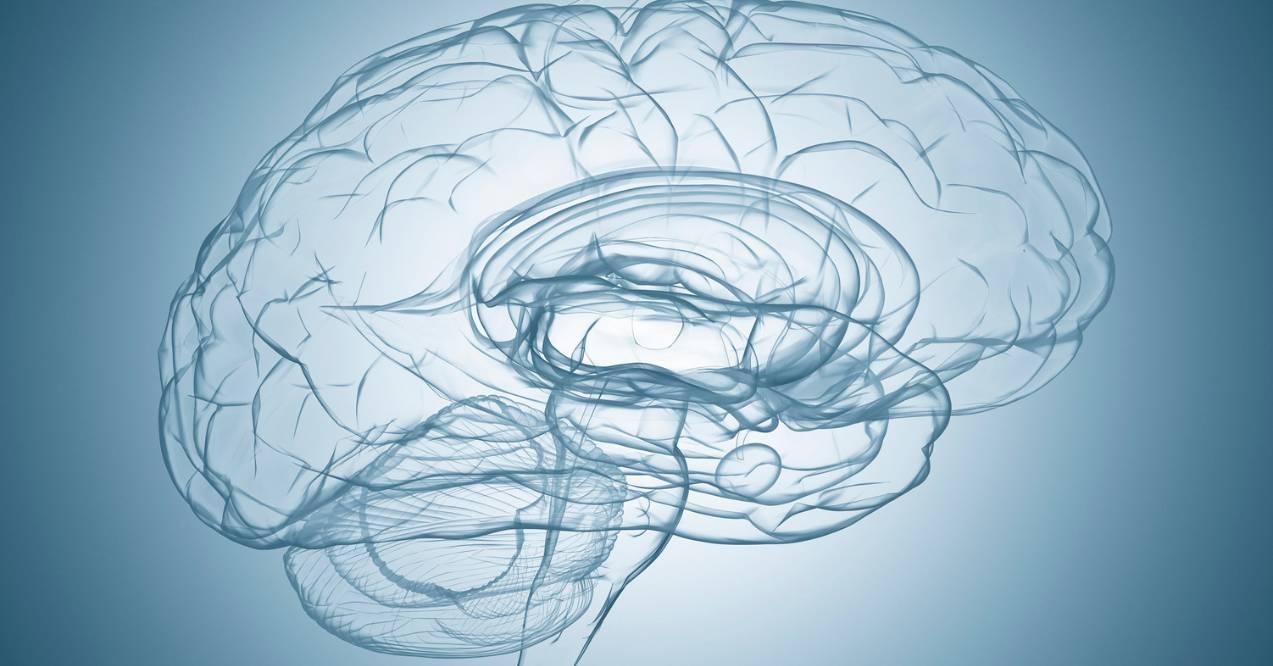Central Nervous System Disorders Symptoms
Knowing the most common Central Nervous System Disorders Symptoms can be a lifesaver. Read on for vital insights and take control of your health today!
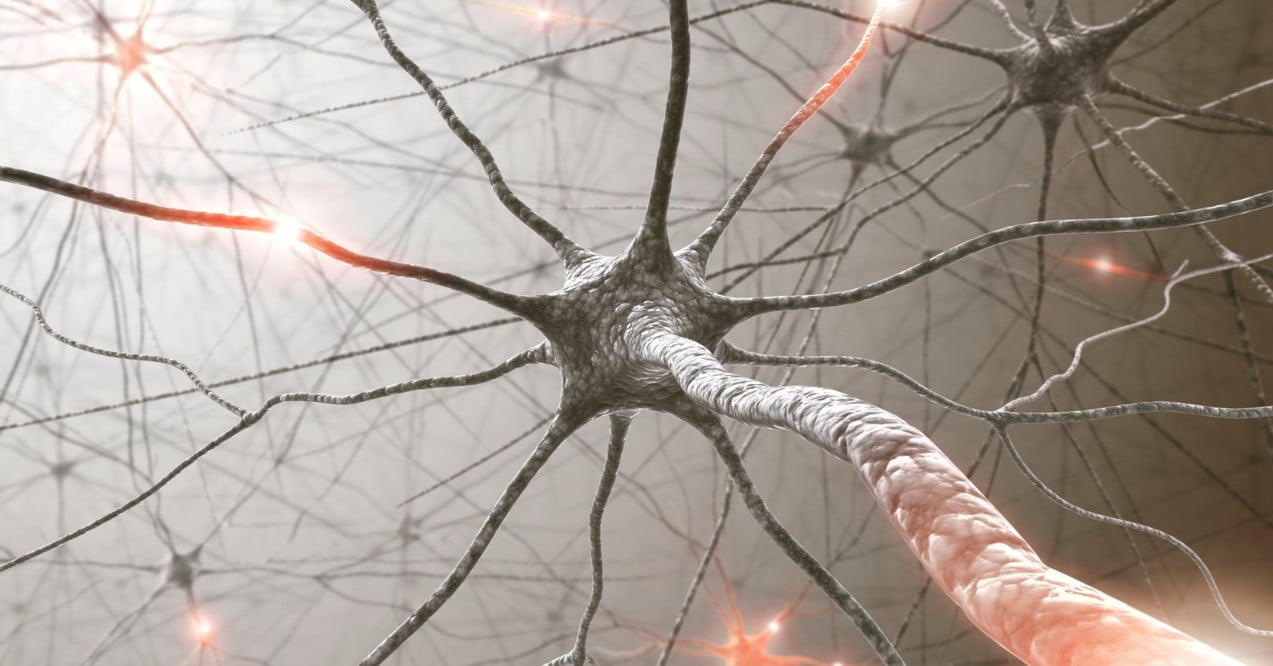

Experiencing central nervous system disorders symptoms can be quite an unsettling and daunting experience that could affect several aspects of your everyday life. Picture this: your body is like a highly efficient communication network, with your brain as the main control center, sending and receiving signals through a complex web of neurons and intricate nerve pathways.
Every time you move, think, breathe, or even blink, it’s thanks to your nervous system working relentlessly behind the scenes. This elaborate collection of tissues and cells ensures your brain’s commands swiftly reach the rest of your body to keep everything running smoothly.
In other words, your nervous system is pretty much like a silent superhero, constantly on duty, regulating your heartbeat, coordinating your movements, and making sure you feel sensations like heat and cold. Yet, like any hero’s journey, your body’s messaging system is not without its trials and tribulations.
Unexpected challenges can disrupt the seamless flow of information, resulting in a potential central nervous system dysfunction. This disruption can manifest in various forms, each classified as a different ailment. Let’s delve into the multifaceted world of central nervous system disorders, exploring their various types, causes, and potential impact on your life. Read on!
What Is the Nervous System?
As mentioned above, the nervous system is your body’s ultimate communication network. It’s the brain, spinal cord, and nerves working together, allowing you to respond to the world around you. Your nervous system has two main parts:
- Central Nervous System: The CNS comprises the brain and spinal cord, and it is responsible for processing and interpreting information from the senses, as well as controlling the body’s movements and functions.
- Peripheral Nervous System: The PNS is made up of all the nerves that connect the CNS to the rest of the body. It is responsible for carrying signals between the CNS and the muscles, glands, and other organs.
In simpler terms, think of the brain as the control center that helps you think, feel, remember, and control your body’s actions. The spinal cord, on the other hand, is the highway that operates and coordinates reflex actions and carries the brain’s messages down the spinal canal. Lastly, the nerves are like cables that branch out from the CNS and carry those signals further, delivering them to the rest of your body.
Without your nervous system, you wouldn’t be able to feel warmth, taste pizza, dance to your favorite tunes, or even read this article. However, the CNS can sometimes have problems that can compromise your brain and mental health and cause spinal cord malfunction. That’s when we talk about central nervous system disorders. Symptoms vary but might include vision problems, headaches, slurred speech, random muscle movements, behavioral changes, and memory loss.
Disorders and Symptoms of the Nervous System
You might experience Central Nervous System Disorders Symptoms for different reasons. But don’t fret! Paying attention to your body’s signals can help you stay on top of things. There are several types of Central Nervous System Disorders to watch out for. The most common ones include:
Vascular Disorders:
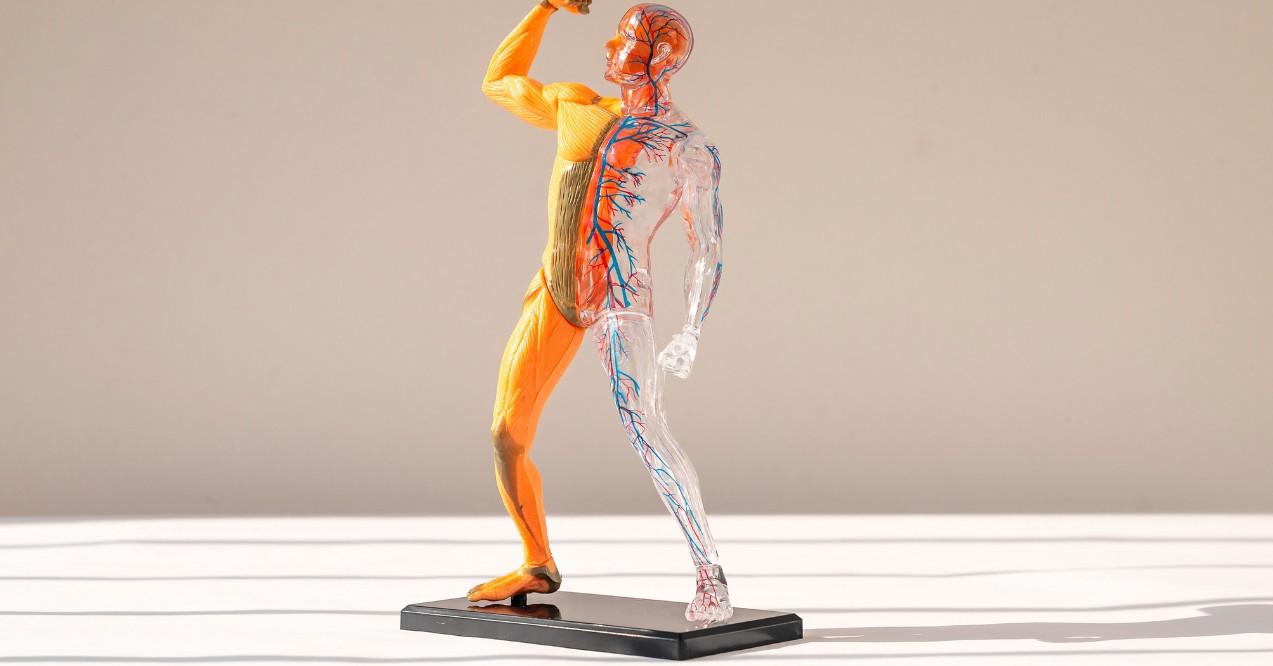
Some disorders of the Central Nervous System involve issues with the brain’s blood vessels. When these problems occur, you’re at risk of experiencing:
- Stroke: Imagine it as a “brain attack.” It happens when blood flow to your brain is blocked, or a blood vessel bursts. This ailment can lead to sudden numbness, confusion, and difficulty speaking. Treatment might involve medication or surgery. (Mayo Clinic, 2023)
- Transient Ischemic Attack (TIA): Often called a “mini-stroke,” this disorder is a temporary blockage of blood flow to the brain. Symptoms are stroke-like but usually last only a few minutes. Your doctor may prescribe medications to reduce the risk of blood clots and lower your blood pressure. (Mayo Clinic, 2023)
- Subarachnoid Hemorrhage: This disorder happens when an artery near the brain’s surface bursts, causing sudden and severe headaches, nausea, and loss of consciousness. Immediate medical attention is essential, and treatment often requires surgery. (Hopkins Medicine, 2019)
- Subdural Hemorrhage and Hematoma: Patients with this condition present bleeding between the brain and its covering. Symptoms may include headaches, confusion, and sometimes loss of consciousness. Treatment could involve surgery. (Harvard Health, 2023)
- Extradural Hemorrhage: It’s an ailment involving bleeding between the brain and the skull. Symptoms often include headache, vomiting, and drowsiness. Urgent surgery is necessary to heat extradural hemorrhage. (UCLA Health, n.d.)
It’s vital to take action to avoid these disorders. Keeping yourself active, eating a healthy diet, watching your blood pressure, saying no to smoking, and handling stress well will help keep those brain-blood-vessel issues away.
Infections:
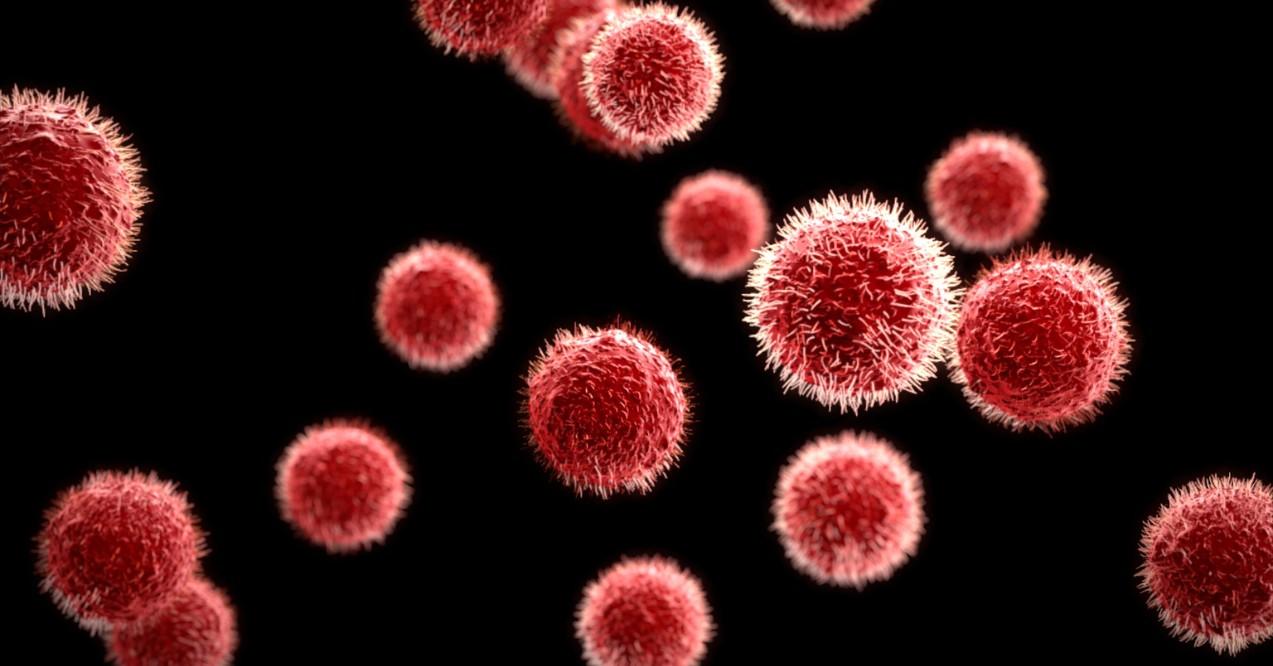
Where harmful germs invade the brain or spinal cord, they can compromise the health of your CNS and cause certain disorders. Let’s break down some key ones:
- Meningitis: This infection can cause the protective layers around your brain and spinal cord to get inflamed. Symptoms can include severe headaches, neck stiffness, and fever. Treatments usually involve antibiotics and rest. (Mayo Clinic, 2023)
- Encephalitis: This condition involves swelling in the brain itself. It can lead to symptoms like confusion, seizures, and even personality changes. Treatment may involve antiviral medications and managing symptoms. (Johnson, 2018)
- Myelitis: Here, the spinal cord is the one that becomes inflamed. Symptoms include muscle weakness and difficulty moving. Treatment often focuses on managing symptoms and, in some cases, antiviral medications. (Mayo Clinic, 2022)
- Epidural Abscess: This ailment produces a collection of pus near the spinal cord. Symptoms might involve back pain, fever, and sometimes neurological problems. Treatment often requires surgery to drain the abscess and antibiotics. (Hopkins Medicine, 2021)
When it comes to CNS infections, prevention is key. Washing your hands, practicing good hygiene, and getting vaccinated can help reduce your risk. It’s also wise to avoid close contact with anyone who might be sick.
Degeneration:

In some cases, vital cells in your brain and spinal cord break down over time, causing a disorder of the Central Nervous System. It’s like a puzzle losing its pieces. Let’s explore some common degenerative CNS diseases:
- Parkinson’s Disease: This disorder affects movement. It’s primarily caused by a combination of genetic and environmental factors, but the exact cause remains unclear. Symptoms often include trembling hands, arms, legs, and jaw, muscle stiffness, and slow movements. Medications, physical therapy, and sometimes surgery can help manage it. (National Institute of Aging, n.d.)
- Amyotrophic Lateral Sclerosis (ALS): Also known as Lou Gehrig’s disease, ALS attacks the nerve cells controlling muscles. It leads to muscle weakness and difficulty in speaking or swallowing. Sadly, there’s no cure, but therapies can improve the quality of life. (Lights, 2022)
- Huntington’s Chorea: This genetic disorder causes uncontrolled movements and changes in mood and thinking. There’s no cure, but medicines and therapies can help manage the symptoms. (Delgado, 2022)
- Alzheimer’s Disease: This condition is highly associated with age-related brain deterioration. People with Alzheimer’s may forget things, get confused, or have mood swings. While there’s no cure, certain medications and supportive care can ease symptoms. (Mayo Clinic, 2023)
While it’s not always possible to prevent these disorders, you can reduce your risk by eating a balanced diet, staying physically active, and keeping your mind engaged with stimulating activities. In addition, you should avoid smoking and limit your alcohol intake to protect your CNS.
Structural Disorders:

Some CNS disorders involve physical problems with the brain or spinal cord. Here are a few structural causes of Nervous System Dysfunction:
- Brain or Spinal Cord Injury: Accidents are a prevalent cause of this issue. Symptoms can range from mild to severe and include headaches, memory problems, and paralysis. Treatment may involve surgery, physical therapy, and medication. (Mayo Clinic, 2023)
- Cervical Spondylosis: This problem can result from the natural wear and tear in the neck’s discs and bones that comes with age. It can lead to neck pain, numbness, and weakness. Treatment may include rest, physical therapy, or even surgery in severe cases. (Mayo Clinic, 2022)
- Carpal Tunnel Syndrome: When the wrist’s nerve gets compressed, it can cause chronic hand pain and numbness. Treatments can involve wrist splints, physical therapy, or surgery. (Mayo Clinic, 2022)
- Brain or Spinal Cord Tumors: Abnormal growths in the CNS can lead to various disorders. Symptoms vary, but they might include headaches, confusion, difficulty walking, and seizures, depending on the tumor location. Treatment can include surgery, radiation therapy, or chemotherapy. (HICCC, 2023)
Preventative measures for structural CNS disorders include wearing helmets and seat belts when needed to ensure safety and avoid injuries. Maintaining a healthy lifestyle and being mindful of your body can also help thwart and manage some of these conditions.
Autoimmune or Inflammatory Disorders:
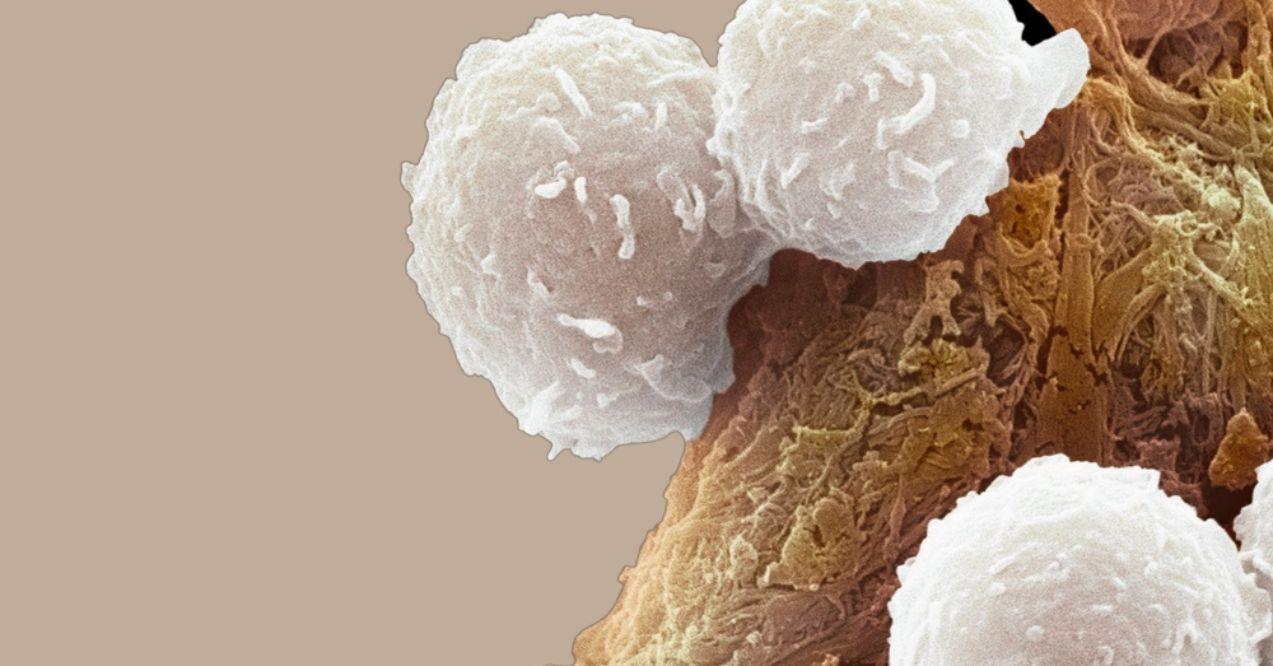
On rare occasions, your body’s immune system may mistakenly attack your own CNS. This issue can lead to various conditions, including but not limited to:
- Bell’s Palsy: This CNS condition is like a sudden face freeze. Symptoms include drooping on one side of the face, twitching, and eyelid dysfunction. The good news is most people recover without treatment. (Kahn, 2023)
- Multiple Sclerosis (MS): This ailment affects the brain and spinal cord. Think of it as a short circuit in your body’s wiring. Symptoms can vary, like numbness, vision problems, or difficulty walking. Treatment might include medication and physical therapy. (Hopkins Medicine, n.d.)
- Peripheral Neuropathy: Sometimes, nerves in the extremities get damaged, leading to tingling, pain, and weakness. Management involves addressing the underlying condition, medications, and physical therapy. (Cleveland Clinic, n.d.)
- Guillain-Barré Syndrome: It’s a rare but serious autoimmune condition, causing muscle weakness and sometimes paralysis. Treatment includes therapies to support recovery. (World Health Organization: WHO, 2023)
To prevent these disorders, maintaining a healthy lifestyle can make a big difference. Eat well, exercise regularly, and manage stress. Don’t forget to follow proper safety measures and avoid smoking or excessive alcohol intake.
Seizure Disorders:
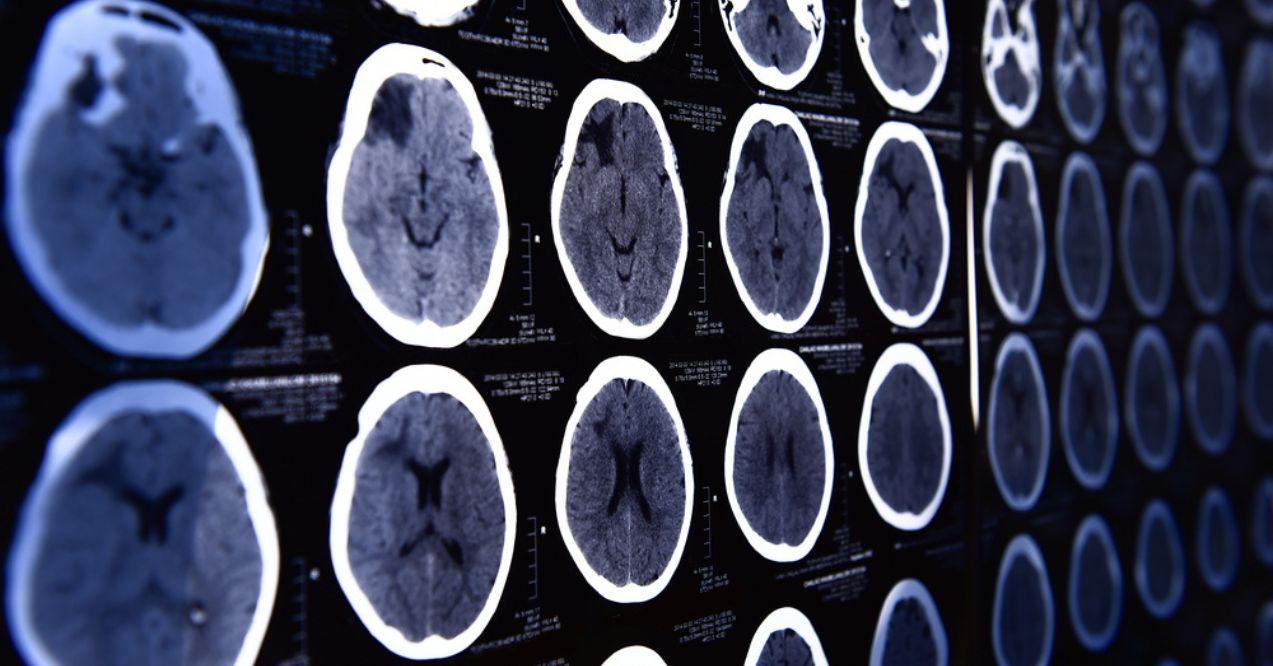
Some types of Central Nervous System dysfunction, like Epilepsy, resemble electrical storms in the brain. Seizures are a common manifestation of such conditions, and they can take various forms — from blanking out for a few moments to more dramatic shaking and convulsions. The symptoms can be scary, but treatment options exist. (World Health Organization: WHO, 2023)
Medications can often help control seizures, making them less frequent or severe. In some cases, surgery or other therapies may be a viable seizure management option. While you can’t always predict or avoid seizures entirely, there are some general steps you can take to reduce risks. Getting enough sleep, managing stress, and taking prescribed medications as directed can make a big difference. (World Health Organization: WHO, 2023)
Mental Health Disorders:

Chemical imbalances can affect your brain’s ability to rewire and adapt. Some mental health conditions that can influence CNS function through complex interactions between the brain and the body are:
- Mood Disorders: These conditions mess with your emotions, sometimes making you feel super high or really low. They may include bipolar disorder, cyclothymia, hypomania, major depressive disorder, disruptive mood dysregulation disorder, persistent depressive disorder, and premenstrual dysphoric disorder. (Sekhon, 2023) Treatment can involve therapy, medication, or a combination of both.
- Depression: This mental health disorder feels like a deep, dark cloud that won’t go away. Symptoms include sadness, loss of interest in things you used to enjoy, and even physical problems like sleep issues or fatigue. However, it’s treatable with therapy and medications. Additionally, many support groups offer other depression management alternatives. (World Health Organization: WHO, 2023)
- Schizophrenia: This ailment feels like having a TV in your head that’s always on. People with schizophrenia may hear voices or believe things that aren’t true. Treatment often includes therapy and medications. (American Psychiatric Association, n.d.)
You can take steps to protect your mental health. Things like staying active, eating well, getting enough sleep, and talking about your feelings with friends or a therapist can really help. Remember, it’s okay not to be okay sometimes, but there’s hope and help out there.
What Are the 5 Most Prevalent Disorders of the Nervous System?
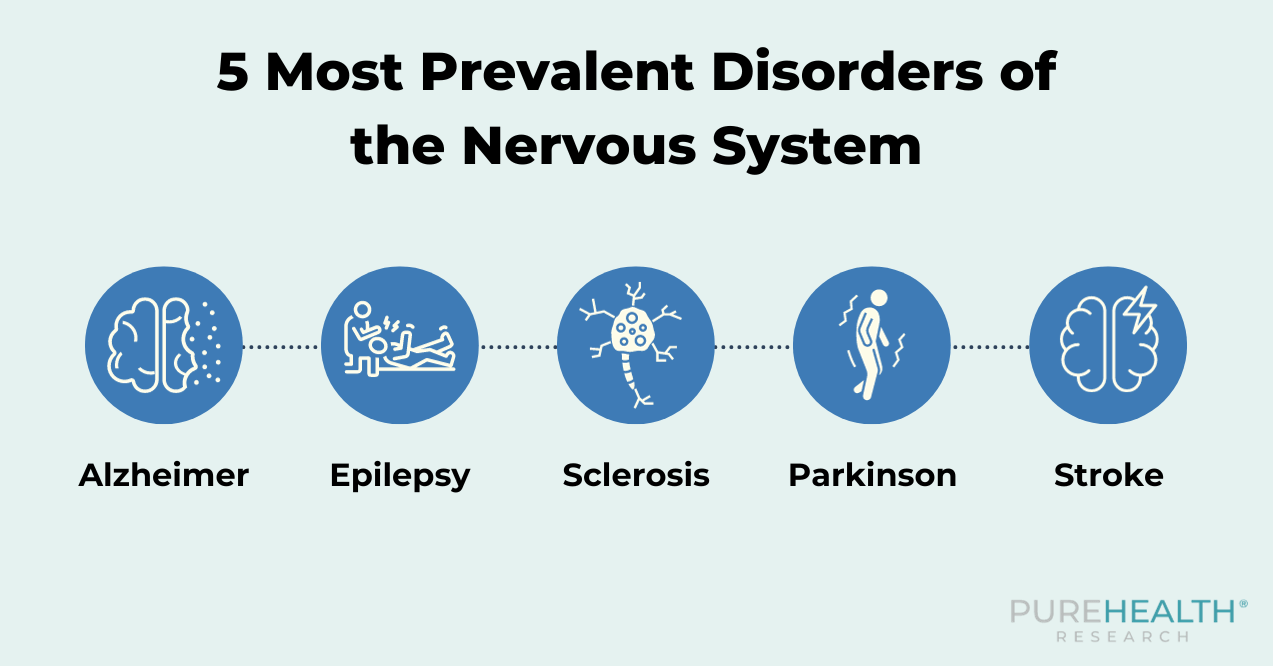
Experiencing CNS disorders can have a significant impact on you and your loved ones. The good news is that early diagnosis and proper management can improve your quality of life. The most common CNS ailments from the ones mentioned above are:
- Alzheimer’s Disease: According to the Alzheimer’s Association (n.d.), Alzheimer’s disease affects an estimated 6.2 million Americans aged 65 and older. It is the sixth leading cause of death in the United States.
- Epilepsy: The World Health Organization (2023) estimates that approximately 50 million people worldwide have epilepsy. It is one of the most common neurological disorders.
- Multiple Sclerosis: The National Multiple Sclerosis Society (n.d.) estimates that an estimated 2.8 million people worldwide have multiple sclerosis. It is more common in women than in men.
- Parkinson’s Disease: The Parkinson’s Foundation (n.d.) estimates that an estimated 1 million people in the United States have Parkinson’s disease. It is the second most common neurodegenerative disorder after Alzheimer’s disease.
- Stroke: According to the World Health Organization (n.d.), an estimated 15 million people worldwide have a stroke each year. It is the second leading cause of death worldwide and the third leading cause of disability.
If you or someone you know is experiencing central nervous system disorders symptoms, it’s essential to seek medical guidance and support. Timely diagnosis and management can significantly improve the prognosis for most patients.
Healthcare Providers Who Treat Nervous System Disorders
Managing Central Nervous System Disorders symptoms and treatments can be tough. Luckily there’s an extensive variety of healthcare professionals ready to support you on your journey to recovery. The list includes:
- Neurologists: These are the brain and nerve experts. They diagnose and treat CNS disorders, providing expert guidance on medications and therapies.
- Neurosurgeons: If surgery is needed, they’re the ones to turn to. They can perform intricate operations on the brain and spine.
- Neuroradiologists and Interventional Radiologists: They specialize in using imaging techniques to get a closer look at your CNS, helping diagnose and guide treatments.
- Psychologists and Psychiatrists: They help you cope with emotional challenges. Psychiatrists can prescribe medications if needed.
- Physiatrists: These doctors focus on rehabilitation, working to improve function and quality of life after CNS disorders.
- Physical Therapists: They help you regain physical strength and mobility through exercises and therapies.
- Occupational Therapists: These experts assist you in developing the skills you need for daily life, like dressing and cooking.
- Speech/Language Pathologists: If CNS disorders affect speech or swallowing, these professionals can help you regain these essential skills.
As mentioned earlier, timely detection and management of any CNS dysfunction can significantly boost your chances of recovery. Keep moving forward, and remember that this dedicated medical squad will do everything in their hands to help you reclaim your well-being and live a fulfilling life.
Final Thoughts
Experiencing Central Nervous System Disorders Symptoms can be challenging, to say the least. Fortunately, there’s hope and help available for those dealing with a CSN dysfunction diagnosis. Here are the key takeaways to remember:
- Your Nervous System is like a superhero, ensuring your body functions smoothly.
- Central Nervous System Disorders come in various forms, affecting your brain and spinal cord.
- Seeking early diagnosis and treatment is essential if you experience symptoms like memory loss or muscle weakness.
- A diverse team of healthcare professionals, from neurologists to therapists, can support your journey to recovery.
- Take steps to protect your Nervous System through a healthy lifestyle, good hygiene, and stress management. Incorporating the best supplements for nervous system health can also provide additional support, helping to nourish and maintain optimal nervous system function.
Your CNS is your body’s friend, and it’s worth taking good care of. With the right care and determination, anyone can overcome the challenges of a CNS disorder and look forward to a healthier and happier future.
A Central nervous system disorder is a medical problem that can affect your brain and spinal cord, making them not work as they should. Central nervous system disorders can happen for various reasons, like problems with blood vessels, infections, or even injuries.
Primary symptoms of central nervous system disorders can include memory loss, muscle weakness, and coordination difficulties. Treatment varies depending on the specific disorder but often involves medications, therapy, and in some cases, surgical procedures.
Healthcare professionals like neurologists, neurosurgeons, and therapists can help you treat central nervous system disorders symptoms. They are the experts who can guide you and provide the right medical advice to make you feel better.
Sign up for our Healthy Living newsletter!
Advertisement. This site offers health, wellness, fitness and nutritional information and is designed for educational purposes only. You should not rely on this information as a substitute for, nor does it replace, professional medical advice, diagnosis, or treatment. If you have any concerns or questions about your health, you should always consult with a physician or other health-care professional. Do not disregard, avoid or delay obtaining medical or health related advice from your health-care professional because of something you may have read on this site. The use of any information provided on this site is solely at your own risk.








